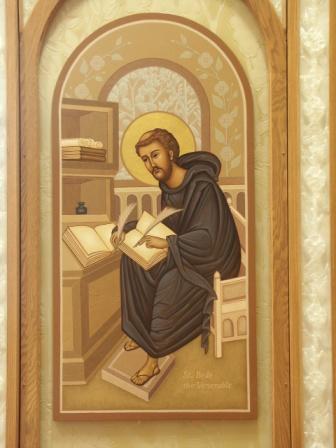
(Icon of St. Bede in the Parish Chapel
written by Christine Uveges, Eikona Studios, Cleveland, OH)
Bede tells us practically all we know of his early life in a few brief sentences appended to his Ecclesiastical History. He was born in 673 or 674 on land to the south of the Tyne which afterwards became the property of the twin monasteries of Wearmouth and Jarrow where his whole life was spent. At the age of seven he was given to the care of Abbot Benet Biscop to be educated. Ordained a deacon at the age of eighteen, he became a priest in702 or 703 when he was twenty-nine.
His monastic life was an uneventful one and we can sum it up in his own words: 'I have spent the whole of my life ... devoting all my pains to the study of the Scriptures, and, amid the observance of monastic discipline and the daily task of singing in the church, it has ever been my delight to learn or
teach or write.' This summary is in very truth the whole of Bede's life. He seldom left the monastery, and we hear of two journeys only. Once he visited York to see Archbishop Egbert and to inspect the flourishing schools there, and on an earlier occasion, to gain material for his life of St. Cuthbert, he stayed at Lindisfarne and from there visited Farne Island to examine the remains of the saint's cell.
It was as a teacher that Bede was supreme. He had no interest in speculation and no desire to be original; his genius was that of one who, with infinite pains, educates himself and transmits not only what he has learned but a deep sense of the value of such knowledge. Of his oral teaching--to which he attached great importance--ofcourse we cannot speak, but his books became standard works of reference in his own lifetime. His carefulness and sobriety of approach, his pains to be accurate, his obvious orthodoxy, gave to them a unique authority. Bede's works fall into three well-defined classes. His theological writings consist mainly of a teacher's commentaries on the Bible, based very largely on the western Fathers and written for the most part in the allegorical manner of Christian tradition. Bede used his knowledge of Greek and displayed what we may think was an innocent vanity in making the most of such Hebrew as he had learned. Yet, despite the lack of originality in his approach, the commentaries of Bede remain even today one of the best means to arrive at the thought of the early Fathers.
His scientific writings consist partly of traditional explanations of natural phenomena, in which the poetic approach of St. Ambrose is sometimes reflected, and partly of treatises on thecalendar and the calculation of Easter--a matter of moment, as the Paschal controversy between Saxons and Celts had by no means entirely died down. It was Bede's popularization of the method of calculating calendar years from the supposed date of our Lord's birth which more than anything else ensured its universal acceptance in western Christendom.
The saint's historical writings are perhaps best remembered today. The chief of these was The Ecclesiastical History of the English People, one of the most important pieces of historical writing of the early middle ages. It is the sole source of much of our information about early Saxon history, and (apart from occasional bias against the Celtic church) it is written with sober objectivity and balance of judgment, dependent upon documentary sources and trustworthy witnesses. Bede also wrote a short history of the abbots of Wearmouth and prose and verse lives of St. Cuthbert.
Bede, then, remained from 679 onwards in the monasteries of Wearmouth and Jarrow, carrying out meticulously the duties of his monastic life and engaged unceasingly in writing and teaaching. Of his holiness, none of his contemporaries had any doubts, and it is refreshing to see that it was accompanied by none of the phenomena dear to the conventional hagiographer, for he worked no miracles, saw no visions and taught no new path to God.
His death was as sober and undeterred as was his life. In the early summer of 735, when he was sixty-three, his health began to fail, and he suffered much from asthma. He was, however, at work until the very end. On the Tuesday before Ascension Day he summoned the priests of the monastery, made them little gifts of pepper and incense and begged their prayers. At intervals during the next forty-eight hours, propped up in bed, he dictated to the very last sentence an English rendering of the Gospel of St. John upon which he was engaged at the onset of his illness. Finally, asking to be laid on the floor, he sang the anthem 'O King of Glory' from the Office of Ascension Day and so died. It was May 27th, 735.
He is still usually referred to by that title given him in his lifetime--'the Venerable Bede'--but since his recognition in 1899 as a saint and doctor of the church, he is sometimes known as St. Bede the Venerable.
The Saints: A Concise Biographical Dictionary, ed. John Coulson
Electronic Text Copyright © 2000 Catholic Information Network (CIN).